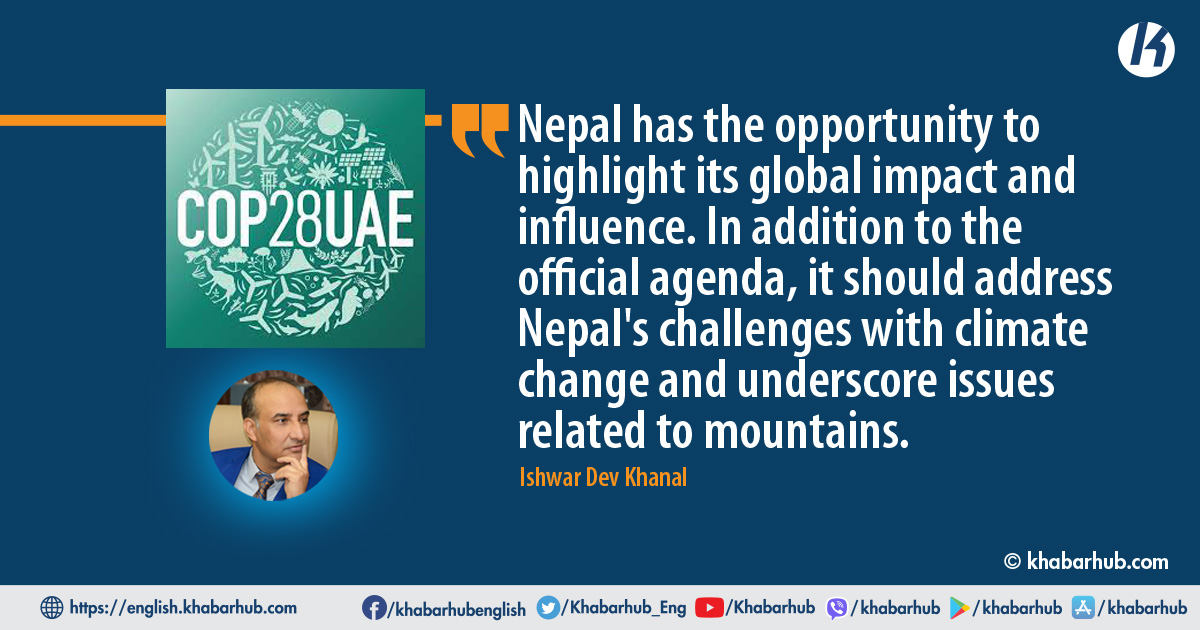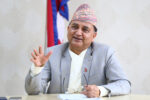COP28, scheduled to take place in Dubai from November 30 to December 12, is anticipated as an unprecedented gathering involving 198 countries, including Nepal, with a staggering 75,000 participants.
The conference, integral to the UN Framework Convention on Climate Change, aims to address the adverse environmental effects of human activities, particularly greenhouse gas emissions.
Nepal’s Prime Minister Pushpa Kamal Dahal is slated to participate in COP-28 with a serious commitment, given the evident impact of climate change on melting glaciers, making Nepal particularly vulnerable to downstream consequences.
Proposing a global center for glacier studies at COP28 can be a proactive step for Nepal, not only addressing the global implications of climate change and glacier melt but also positioning Nepal as a valuable contributor to the international community’s understanding of these critical issues.
To achieve quick wins, Nepal could prioritize transitioning from fossil-fuel vehicles to electric vehicles in cities like Kathmandu, leveraging its smaller size for efficient implementation.
However, such initiatives require strong political commitment and stakeholder engagement to ensure successful execution.
Recognizing climate change as a collective responsibility, it is essential for Prime Minister Dahal to demonstrate unwavering commitment to climate action in the summit, playing a significant role in fostering global collaboration and inspiring tangible solutions to address the urgent challenges posed by climate change.
The summit aims to finalize aspects such as financing, eligibility criteria for accessing support, and operationalizing the Global Goal on Adaptation, a framework established during the Paris Agreement to assess countries’ progress in adapting to climate change.
The current level of government commitment to reducing greenhouse gas emissions, as outlined in the Nationally Determined Contributions (NDC), falls short of meeting the global expectations of limiting temperature rise to 1.5 degrees Celsius by the 21st century.
It is imperative for nations, including Nepal, to enhance their commitments, particularly focusing on those with significant historical emissions and impacts.
A critical step at this juncture is to conduct a comprehensive stocktaking of the past two years, providing additional data to assess the current status of climate action.
Notably, the previous Conference of the Parties (COP) saw a breakthrough on the issue of losses and damages, a contentious matter between developing and developed nations.
While Nepal exhibits commitment to climate action, the translation of this commitment into tangible action is crucial.
Merely making pledges, without effective implementation, places Nepal in a category shared by other countries that struggle to turn promises into reality.
Financial support remains a persistent challenge. The 2015 commitment of US$100 billion annually for climate financing has not materialized as anticipated.
It is imperative for countries to fulfill their pledges, and potential contributors must step up efforts.
Without adequate funding, progress on climate mitigation and adaptation will be severely hindered.
Taking place at the conclusion of a year predicted to be the hottest on record, COP28 is expected to be influenced by global challenges such as international conflicts, economic pressures, and devastating fire seasons.
The summit will also mark the end of the inaugural global stocktake, a two-year evaluation of progress toward the commitments of the 2015 Paris Climate Change Agreement.
The findings of the first global stocktake, released in September 2023, indicate that governments are not on track to meet emissions reduction goals outlined in the Paris Agreement.
Furthermore, COP28 will focus on crucial pillars outlined by the UAE, including energy transition, climate finance, and inclusivity.
The energy transition initiative, led by over sixty countries, aims to triple global renewable energy capacity by 2030 while promoting decarbonization technologies in heavy-emitting sectors. Addressing the financial gap for climate action remains a challenge, with the need for $4 to $6 trillion annually until 2030.
Inclusivity efforts involve inviting youth delegates from island nations and lower-income countries to amplify underrepresented voices in climate discussions.
Despite this, current policies have mitigated the worst-case warming scenarios, providing a degree of relief from the anticipated temperature increase.
COP28 also aims to fast-track an equitable energy transition, address climate finance issues, prioritize nature, lives, and livelihoods in climate action, and promote inclusivity.
Additional objectives for the conference include mobilizing multilateral development banks to increase incentives for private sector investments in climate-related projects, enhancing accountability measures for the private sector to fulfill net-zero commitments, and establishing common standards for voluntary carbon markets to address concerns of fraudulent carbon offset programs.
The primary focus will be on accelerating the energy transition, with debates centering on sustainable fossil fuel use.
The EU, meanwhile, has advocated for a historic deal to phase out global use of “unabated” coal, oil, and gas, while other nations, including major fossil fuel producers and developing countries, may resist.
Additional proposals include a deal to triple global renewable energy capacity and double energy efficiency improvements by 2030, though some parties insist on an integrated approach to phasing out fossil fuels.
Dubai has extended invitations to over 200 governments, with heads of state or prime ministers from 167 countries confirming their attendance.
Prominent leaders, including those from France, Germany, India, Brazil, Japan, and the UK, are expected to deliver statements outlining their nations’ climate commitments.
Notably, the leaders of the world’s largest emitters, US President Biden and China’s President Xi, are unlikely to be present, as per officials.
UK Prime Minister Rishi Sunak has confirmed his attendance, albeit with controversial adjustments to Britain’s net-zero policies.
King Charles III, representing the government, will also be present and deliver the opening address for the third time, following his participation in COP26 in Glasgow and COP21 in Paris.
Despite earlier discouragement, the monarch, known for climate advocacy, will attend.
Negotiations at COP28 will span various issues, including phasing out fossil fuels, increasing renewable energy, and mobilizing funds to support vulnerable nations in coping with climate change impacts.
An exceptional addition to this year’s attendees is Pope Francis. The 86-year-old Pontiff, renowned for his climate advocacy, issued a passionate appeal, urging hesitant politicians to take decisive action.
Pope Francis is scheduled to address conference delegates on December 2, as confirmed by the Vatican.
Additional objectives for the conference include mobilizing multilateral development banks to increase incentives for private sector investments in climate-related projects, enhancing accountability measures for the private sector to fulfill net-zero commitments, and establishing common standards for voluntary carbon markets to address concerns of fraudulent carbon offset programs.
Furthermore, COP28 will prioritize discussions on climate adaptation and resilience, particularly in lower-income countries.
Topics will encompass commitments to combat biodiversity loss, adopt sustainable farming methods, and address unresolved details of the Loss and Damage Fund, a significant funding mechanism for climate resilience.
The summit aims to finalize aspects such as financing, eligibility criteria for accessing support, and operationalizing the Global Goal on Adaptation, a framework established during the Paris Agreement to assess countries’ progress in adapting to climate change.
Negotiations at COP28 will span various issues, including phasing out fossil fuels, increasing renewable energy, and mobilizing funds to support vulnerable nations in coping with climate change impacts.
The success of mitigating severe climate impacts hinges on each country presenting ambitious commitments and actions at COP28.









Comment